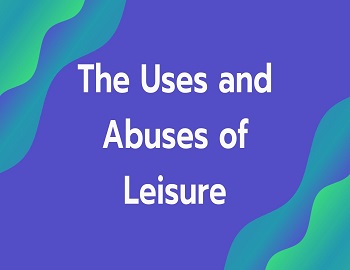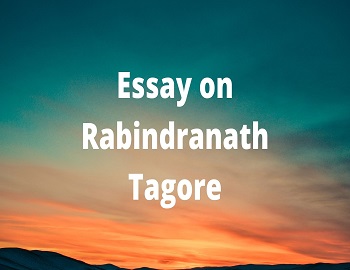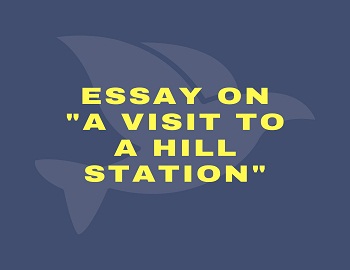The Uses and Abuses of Leisure:
| What is this life if full of care, We have no time to stand and stare? |
So sang the poet W. H. Davies. Leisure means the free time that we have after the day’s hard labour. It means the time for rest and recreation after our routine professional work is over. Life is worthless if we have work care and anxieties only and no time to stand and state, i.e. to look at the beautiful objects of Nature. Most of the work that we do is dull and tiresome. We need rest to recoup our lost energy and to give rest to our tired body and mind. So leisure is highly essential for a busy man.
After we have made proper use of leisure, we feel refreshed and attend to our work with renewed vigour and interest. Leisure brings a change in our routine work and life. If there is no leisure and rest and recreation in a man’s life, he often becomes bored, irritable and quarrelsome.
Today we live in a machine age. We have to live and work like a machine otherwise we cannot make both ends meet in this competitive world. But the Indian workers have not got enough money to enjoy their leisure like their brethren in the western countries- U.S.A., England, West Germany etc. Many of them spend their leisure in enforced idleness. The problem of leisure is closely connected with the problem of money. Surely you need money to spend your free time or leisure in reading an interesting book or go on a picnic or excursion, or pay for a seat in a cinema hall, or purchase a ticket at a football match in a stadium etc. As a poor worker has no money to enjoy his leisure more often than not he is forced to sit at home and sleep on his holidays.
Leisure can be profitably used in adopting some hobbies such as gardening, mountaineering, boating, swimming, riding, collection of stamps and coins, photography, singing and dancing and playing upon a harmonium and so on. Taking part in games and sports is also a useful hobby. In the west people also use their leisure for self-improvement. In short, one should spend one’s leisure in such pursuits as are both interesting and instructive, and as refresh our mind and strengthen our body. Most of the great men of the world spend their free time on useful hobbies. The famous scientist Einstein spent his leisure playing upon a sitar. The noted film star Ashok Kumar spends his leisure in studying horoscopes. Pandit Nehru was fond of riding, while Gandhiji of morning walks and evening prayers. Free time can also be usefully spent in meditation.
But some people misuse leisure. They spend even their free time earning money. Day in and day out they are after the material gains. As they work hard without any rest, they often suffer from a nervous breakdown, blood pressure and many other ailments. They have no time to look after their body, mind and soul. In their search for material prosperity, they lose their peace of mind.
Then there are people who spend their leisure in evil practices. They indulge in drinking and gambling, litigation and anti-social activities. Some idle away their leisure. An empty mind becomes a devil’s workshop in their case. “I have seen men come into a fortune,” says G.B. Shaw, “and lose their happiness, their health and finally their lives because of excessive smoking, drinking and indulging in wasteful habits”.
So you must have money to enjoy your leisure, but the money must be well spent. It is not at all easy to know what to do with leisure unless we have been brought up to it.
On the whole, we shall have to admit that leisure is of utmost importance in our life. Time spent on leisure is generally well-spent. It is the time for rest, recreation and cool thinking. It makes our tired mind and body fresh and active. We can enjoy the beauties of nature, art and life in our free time only. Hence life without leisure is a life without pleasure. The world has not yet realized the importance and value of leisure. Only the constitution of Russia guarantees compulsory leisure for all its citizens.









Comments (No)